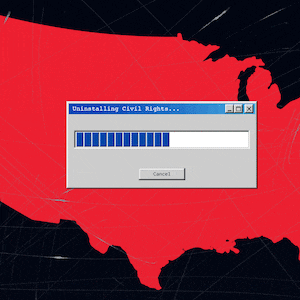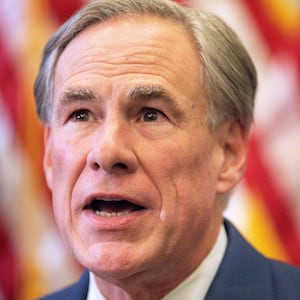Former Vice President Mike Pence traveled to Georgia on Monday with two missions in mind: engaging in a bit of the low-stakes political theater while also, his allies hope, bolstering a public reputation that has even Republicans turning up their nose at the Pence brand. It’s clear Pence excelled at the theatrics; moving his sagging favorability rating will be a tougher challenge.
Pence was in Georgia to support Gov. Brian Kemp, who is facing a primary challenge from his right by former Sen. David Perdue. Perdue has the backing of former President Donald Trump and the furious support of the core MAGA gang, but not much else. Recent polling has Kemp leading by Perdue by double digits, and clearing the 50 percent threshold required to avoid a costly runoff election.
But Kemp wasn’t really ever in danger, and that’s a big reason Pence felt safe enough to make Georgia the backdrop for his big break with Trump. Pence’s unwillingness to wade into races where he can actually make a difference is a turnoff for voters looking for bold truth-tellers. And even when Pence does speak up, he says nothing.
"When you say yes to Gov. Brian Kemp tomorrow, you will send a deafening message all across America that the Republican Party is the party of the future," Pence said in remarks that avoided mentioning Donald Trump’s name even once. Pence’s moral failure, or at least his most recent moral failure, rests in thinking that Republicans can build a post-Trump future without reckoning with their Trump-filled present.
Pence might have hoped that a year and a half out of the headlines might have improved Americans’ dim reputation of him. In fact, things only got worse. A Politico/Morning Consult survey conducted in the first half of May found Pence with a net favorability rating of -13, with only 38 percent of those polled saying they viewed Pence in a positive light. That’s eight percentage points worse than the same survey conducted almost exactly a year ago.
Inaction, always Pence’s preferred strategy, was not creating a viable pathway to the 2024 presidential campaign he sees in his future. That created a conundrum: if Pence wants to mount a serious run for president in 2024, he needs to at least appear to be playing a leadership role in the ideological fights roiling the GOP. But as his White House tenure proved, Pence is also a man of uncommon cowardice when it comes to taking a moral stand.
Pence knows he’d face a sea of blame, Trumpian venom, and death threats if his endorsement of an anti-Trump candidate actually changed the outcome of a major election. That’s why Pence remained passive and silent during the Ohio GOP primary that nominated far-right Trump toady J.D. Vance, and offered no thoughts on Pennsylvania’s Republican civil war over Trump’s endorsement of daytime talk show grifter Dr. Mehmet Oz.
Both of those races could have shifted had Pence voiced his newfound distaste for Trump and the MAGA political model. Vance was in a tight race before the final week, and Oz currently leads his opponents by only 980 votes. Instead of taking a political risk, Pence parked his influence on Kemp’s huge polling and fundraising advantage in Georgia. In an era of increasingly outlandish political spectacles, Pence’s kiddie-pool politics isn’t disruptive enough to change the course of Republican politics, and it isn’t genuine enough to spark a broader reconsideration of Pence’s character.
For all of his efforts to balance the appearance of change with the pointlessness of his visit, Pence was rewarded with another scathing criticism from his former boss. “Mike Pence was set to lose a governor’s race in 2016 before he was plucked up and his political career was salvaged," Trump spokesman Taylor Budowich said. "Now, desperate to chase his lost relevance, Pence is parachuting into races, hoping someone is paying attention."
As strange as it is to say, Trump’s read of the situation is right, and it’s a view held by more than just Republicans’ MAGA majority. If Pence’s Georgia trip marked his best attempt yet to distance himself from a populist, authoritarian movement he claims to disown, it was often impossible to tell the difference between Pence and another Georgian, far-right Rep. Marjorie Taylor Greene.
Pence echoed some of Greene’s greatest hits in a scripted aside during his speech, digressing briefly to bash the “radical left” and do a little Critical Race Theory conspiracy theorizing. That’s no surprise—before his time in Congress, Pence enjoyed a successful career in right-wing talk radio, hawking the same bigotry and vitriol he now claims marks a dead-end for the Republican Party. The only difference between Pence and the MAGA goons filling Twitter with White Replacement Theory misinformation is that Pence got a regular paycheck to vent his anti-government bile.
With his eyes now fixed on 2024, Pence is a man in search of a constituency. He bears the permanent mark of disloyalty branded onto him by Trump in the days after the Jan. 6 insurrection. The establishment suits that once offered a guy like Pence safe haven are now a near-extinct species in national Republican politics. But Pence has already revealed his remedy for Republican ills: simply pretending the Trump years never happened and focusing on “tomorrow.”
It’s ironic, then, that the party bigwigs and center-right voters Pence is envisioning as the backbone of his 2024 strategy were driven out of the GOP in part due to Pence’s loyal silence during Trump’s various party purges. Had Pence shown actual courage and spoken up earlier, instead of waiting for the least-risky moment to do so, he could potentially have preserved a chunk of the GOP that would have been grateful for the vice president’s protection. Instead, he chose silence.
After five and a half years of dutiful silence, Pence shouldn’t be surprised to discover he’s now preaching to a Republican Party that can no longer hear him.








